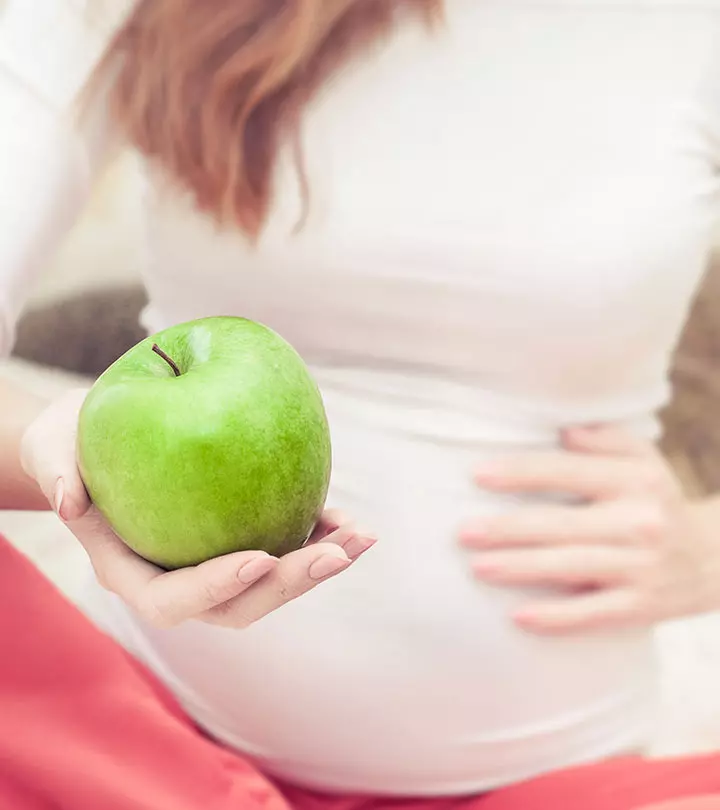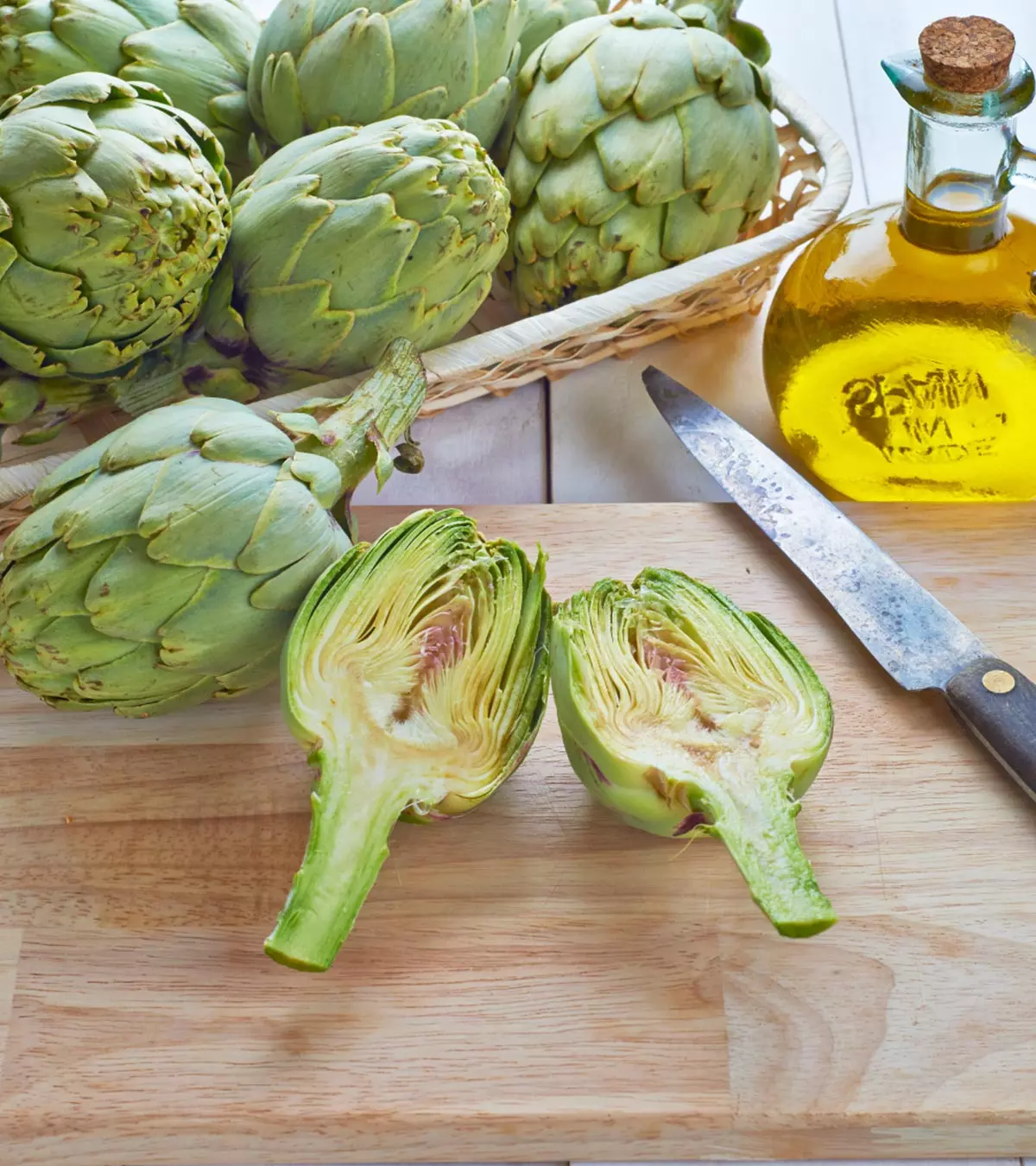
Image: Shutterstock
Women may be unsure whether eating artichoke during pregnancy is safe or unsafe. When carrying a baby, you need to eat highly nutritious food to nourish your baby and yourself.
Artichoke is a vegetable with several benefits for both maternal and baby health. It is known to improve digestive health, relieve nausea and heartburn, and prevent intestinal gas. It is also used to relieve the symptoms of other health issues, such as liver disorder, high cholesterol, and arthritisiAn inflammatory condition characterized by swelling, stiffness, and pain in the joints .
However, do these benefits make it safe for consumption during pregnancy? Read on if you are curious to know the benefits, side effects, and ways to eat artichoke during pregnancy.
Key Pointers
- Artichokes can alleviate pregnancy symptoms such as nausea, gas, and heartburn.
- Artichokes are packed with nutrients that promote fetal development and cell growth.
- Artichokes are a low-fat, low-calorie, high-fiber food that’s rich in choline, folate, magnesium, and vitamin C.
- If you have chronic liver problems or gallstones, consult your doctor before consuming artichokes.
What Is Artichoke?
The vegetable originated from the Mediterranean, belongs to the sunflower family.
The edible portion of the plant is the flower bud. It stimulates bile flow and helps you overcome uncomfortable symptoms of nausea, intestinal gas, and heartburn, during pregnancy. Some common health ailments controlled with regular intake of this plant-based food are kidney problems, liver problems, high cholesterol, arthritis, bladder infections, and irritable bowel syndrome(IBS)iA gastrointestinal disorder characterized by abdominal cramping, diarrhea, constipation, and bloating (1). As a stimulant, artichoke also recovers from high blood sugar level, snakebites, and reduced urine flow. People often use the chemicals CynariniAn active biological food component found in artichoke leaves, known for its antioxidant and cholesterol-lowering properties and chlorogenic acidiAn antioxidant compound found in various fruits and vegetables present in artichoke as natural sweeteners in cooking.
 Quick tip
Quick tipCan Pregnant Women Eat Artichoke?
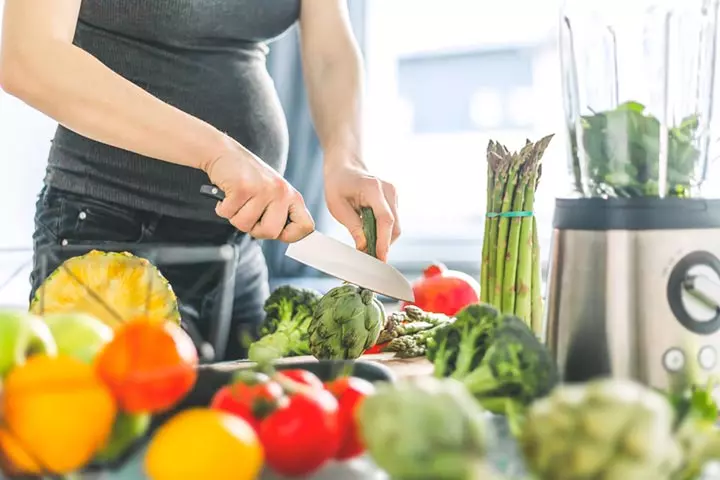
During pregnancy, it is recommended that you include these super-healthy artichokes in your daily diet. You can simply cook the buds or stir-fry them with different pasta dishes. The low percentage of fat, sugars, calories, and high fiber content promotes the proper development of your unborn fetus.
Benefits Of Eating Artichoke During Pregnancy
Here are some of the health benefits of having fresh artichokes on a pregnant woman’s health:
1. Supplies Choline:
- Eating artichokes during pregnancy can supply antioxidants such as choline to your body that aid in your baby’s healthy brain cell development.
- The recommended daily intake of choline during pregnancy should lie around 450 milligrams, and a single artichoke supplies almost 41 milligrams.
- Choline helps in improving your baby’s memory and protects him from severe mental illnesses and birth defects such as neural tube defectsiCongenital abnormalities in the brain, spine, or spinal cord that usually happen during the early weeks of pregnancy (2).
- By lowering the percentage of amino acid homocysteine in your body, it protects you from the risk of breast cancer.
- A high proportion of homocysteine in your blood can cause cancer, heart disease and cognitive decline.
2. Supplies Folate:
- During pregnancy, your diet must comprise the key nutrient folate as it aids in continuous growth, production and development of new cells.
- A single artichoke supplies 107 micrograms of folate that helps in the healthy growth of your baby.
- An adequate amount of folate protects you from the risk of neural tube defects and spina bifidaiA congenital disorder where the spinal cord doesn't fully develop, leading to physical and neurological complications (3). According to the Centers for Disease Control and Prevention (CDC), approximately 1427 babies are affected by spina bifida in the US.
- Folate protects your unborn child from deformities in the brain and skull.
- Insufficient folate also imposes premature birth and low birth weight.
3. Fiber-Rich Food:
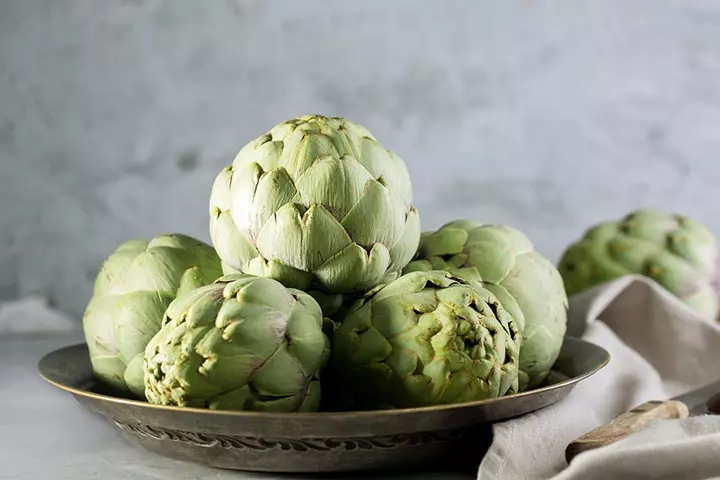
- In pregnancy, you are at a higher risk of experiencing abnormal bowel movements, severe constipation, and nausea.
- The growing uterus imposes an excess pressure on your intestines, and you experience such conditions. Intake of artichokes may regulate your bowel movements and improve digestion.
- A single artichoke supplies almost 10 grams of fiber that keeps you protected from digestive problems during pregnancy.
4. Supplies Magnesium:
- During pregnancy, your body needs sufficient magnesium for tissue development.
- Low magnesium levels during pregnancy can elevate the risk of leg cramps, fluid retention, and restless legs.
- Artichokes, being a good source of minerals such as magnesium, supplies almost 50 milligrams and fulfills your dietary requirements.
5. Low In Fat And Cholesterol:

- During pregnancy, you should eat low-calorie foods to reduce the risk of pregnancy and birth complexities.
- Your daily cholesterol intake should not exceed above 300 milligrams per day.
- Artichoke is a fat and cholesterol-free vegetable and can keep your heart healthy and protect you from cardiovascular ailments and high blood pressure or preeclampsia during pregnancy.
6. Supplies Additional Nutrients:
- A medium-sized artichoke provides almost 1.33 milligrams of niacin that aids in healthy development of your newborn baby’s skin. Additionally, niacin helps in improving your baby’s nervous and digestive system.
- A medium-sized artichoke supplies 8.9 milligrams of Vitamin C that helps in boosting your baby’s immune system.
- Artichoke also contains a small percentage of iron that protects you from the risk of anemia and premature delivery.
- Some of the other healthy nutrients present in artichoke include riboflavin, Vitamin A, and Calcium.
- The fructose present in artichoke can sometimes cause uncomfortable gas during pregnancy. In such conditions, you should limit your intake (2).
Note:
As with any food during pregnancy, it is important to talk to a healthcare provider about incorporating artichokes into your prenatal care diet.
Talking about artichokes, Jean Knight Pace, a mom and blogger, says, “They have an almost sweet aftertaste. It is the flavor all foods will leave in our mouths when we eat in heaven. When I was pregnant, I hated eating. Nothing ever sounded good to me, and everything left this horrible aftertaste in my mouth that I loathed (chocolate–my beloved chocolate; it was the worst of all). Everything, that is, except artichokes. Artichokes would leave this sweet touch of something on my tongue that just made me want to go around sucking on my mouth for an hour afterward. When I was pregnant, artichokes were the one food I looked forward to (i).”
Side Effects Of Artichoke During Pregnancy
Artichoke leaf extract aids in healthy liver functioning and controls your cholesterol level. Some of the common digestive problems treated with artichoke leaf extracts are stomach upset, mild diarrhea, and nausea. However, there are certain side effects of artichoke on maternal health that you should remain aware of:
1. Effects On Liver And Gallbladder:
- Regular intake of artichoke when pregnant improves your digestive system functioning and removes the unwanted toxins from your liver.
- As the artichoke stimulates your bile flow, if you suffer from chronic liver ailment you should refrain from taking the vegetable regularly.
- Artichoke leaf extracts can also cause unwanted gallbladder contractions (1). So, if you are suffering from gallstones, you should intake the vegetable only after consulting your gynecologist.
2. Allergic Reaction:

- If you are allergic to ragweed, daisies, arnica or marigold, you can also be allergic to artichoke leaf extract (1).
- Some of the typical signs of allergic reactions may include itching, skin rashes or hives, difficulty swallowing, swelling, or wheezing.
3. Diuretic Effects:
- In ancient times, artichoke served as a diuretic and helped treat kidney and liver problems.
- But you should remain aware that excessive intake of artichoke can cause frequent urination.
Tips To Store Artichokes
Here are some tips on how to store artichokes properly:
- Store artichokes in a plastic bag with a sprinkle of water to ensure they don’t get dehydrated.
- Ensure not to put too much water into the artichokes, as that might cause them to become moldy.
- Put them in the vegetable bin of the refrigerator.
- If the artichokes are already a bit dehydrated, cut the brown part of the bottom of the stem off and put the remaining artichokes in a bowl of water. It will help them last for about a week in the high-humidity bin of the refrigerator (4).
- Try consuming the artichokes as soon as possible to prevent them from going bad and enjoy their benefits to the fullest.
Different Ways To Eat Artichoke During Pregnancy

- You can simmer a trimmed artichoke in a large saucepan for about 20 to 30 minutes. Let the vegetable cook, so that you can quickly pull away the bottom leaves.
- You can eat the cooked artichoke by seasoning it with salt and olive oil.
- Trim the thick leaves of the artichoke and you can incorporate them with your green salad or a hot vegetable soup.
- You can make a fine puree of cooked artichoke leaves mixed with plain low-fat yogurt in a blender and use it as a dip.
- You can also add the cooked artichoke leaves into different types of pasta recipes.
 Quick tip
Quick tipFrequently Asked Questions
1. Can artichokes cause any miscarriage during pregnancy?
Moderate consumption of artichokes is considered safe during pregnancy. A study on rats showed that administering higher doses of artichoke leaf extract negatively affected fetuses (5). However, there is no conclusive evidence that artichokes can lead to miscarriages in humans.
2. Can artichokes cause any birth defects during pregnancy?
There is no scientific evidence to suggest that artichokes can cause birth defects. On the contrary, artichokes may aid in the proper growth and development of the fetus due to their rich nutrient profile.
3. Can artichokes cause any high blood pressure during pregnancy?
No scientific evidence indicates a link between consuming artichokes and high blood pressure during pregnancy. In fact, research has shown that artichoke leaf juice may potentially lower blood pressure, particularly in individuals with mild hypertension (6).
4. Can artichokes cause any weight gain during pregnancy?
Artichoke consumption during pregnancy is unlikely to cause weight gain as they are low in fat, sugars, and calories while being a good source of fiber.
Artichoke during pregnancy is recommended as a part of a balanced diet. It is a nutrition-packed food containing choline and folate for fetal brain development, niacin for healthy skin, and other nutrients such as vitamin C, calcium, iron, and magnesium. Its bile-stimulating effect helps improve gastrointestinal issues. However, it should be consumed in moderation and avoided if you are allergic to daisies or marigolds or have a preexisting liver or gall bladder problem. Many women consume different raw vegetables during pregnancy. However, you may boil, puree, or cook artichoke to include it in your healthy diet during pregnancy along with other vegetables and fruits for healthy pregnancy. Talk to your healthcare provider for personalized advice and to see how artichokes can best fit into your diet during pregnancy.
Infographic: Ways To Include Artichoke In Your Pregnancy Diet
Artichokes are an excellent food to add to a pregnancy diet. They offer many crucial nutrients that the baby in the womb needs for growth. They are also low in calories and high in fiber. So they are good for maintaining your overall health. Here are some ways to include them in your diet.

Illustration: Momjunction Design Team
Illustration: Wonderful Benefits Of Eating Artichoke During Pregnancy
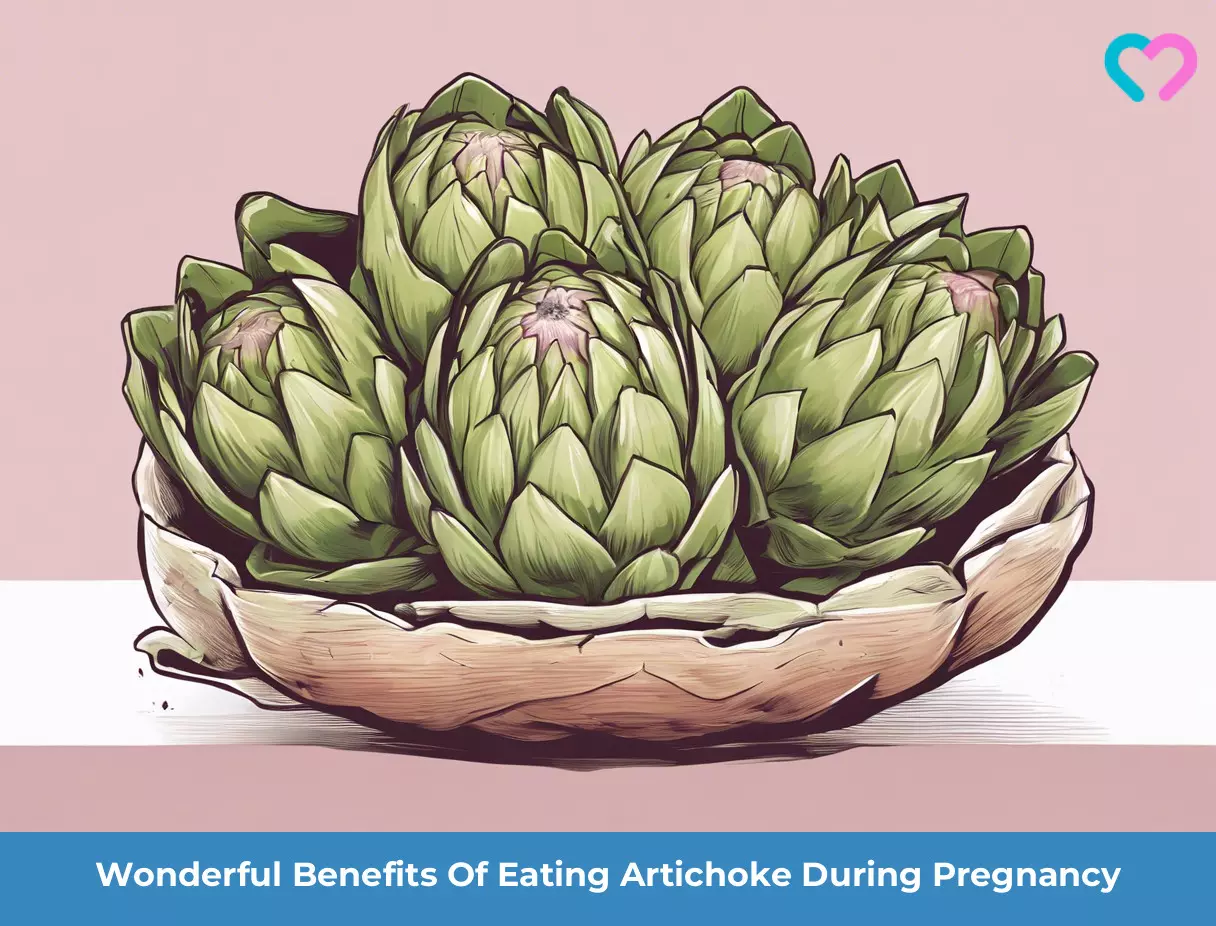
Image: Stable Diffusion/MomJunction Design Team
Artichokes have been cultivated since ancient times for their delicious flavor and the benefit that they have on your health and well-being. Find out what exactly happens to your body when you start eating artichokes!
Personal Experience: Source
MomJunction articles include first-hand experiences to provide you with better insights through real-life narratives. Here are the sources of personal accounts referenced in this article.
i. How to cook and eat an artichokehttps://tastycheapskate.blogspot.com/2012/03/how-to-cook-and-eat-artichoke.html
References
- Health Benefits of Artichoke Hearts (Superfood Series).
https://www.healwithfood.org/health-benefits/artichoke-hearts-superfood.php - Nutrition During Pregnancy.
https://www.acog.org/womens-health/faqs/nutrition-during-pregnancy - Folate and pregnancy.
https://www.pregnancybirthbaby.org.au/folate-and-pregnancy - Food & Vegetable Storage Tips.
https://organicstoyou.org/kitchen/food-and-vegetable-storage-tips - André Tadeu Gotard et al.; (2019); The effect of Cynara scolymus (artichoke) on maternal reproductive outcomes and fetal development in rats.
https://www.sciencedirect.com/science/article/abs/pii/S0273230019300042 - Farshad Roghani-Dehkordi and Amir-Farhad Kamkhah;(2009); Artichoke leaf juice contains antihypertensive effect in patients with mild hypertension.
https://pubmed.ncbi.nlm.nih.gov/22435514/
Community Experiences
Join the conversation and become a part of our nurturing community! Share your stories, experiences, and insights to connect with fellow parents.
Read full bio of Dr. Anita Gupta
Read full bio of Ria Saha
Read full bio of Swati Patwal
Read full bio of Lorraine Teron









